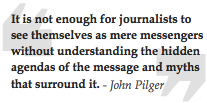'THE COMING WAR ON CHINA' NOW IN AUSTRALIAN CINEMAS AS TRUMP'S MAN BEATS WAR DRUMS
13 January 2017

'The Coming War on China' is a film for cinema and TV by John Pilger...
**** 4 stars
"A gripping film ... a strong corrective to our bland and complacent indifference"
Peter Bradshaw, Guardian
**** 4 stars
"Essential viewing"
Radio Times
**** 4 stars
"A film that will change hearts and minds"
The Upcoming
"Shocking, terrifying, disturbing"
Entertainment Focus
"The kind of stark warning we need"
Cinevue
"The aim of this film is to break a silence: the United States and China may be on the road to war, and nuclear war is no longer unthinkable"
John Pilger
This new feature-length documentary by award-winning journalist and filmmaker John Pilger is his 60th film for television. Coming straight after the election of President Trump, the film is one of John Pilger's most timely and urgent investigations. As Trump threatens China with a trade war and worse, this film is both a warning and an inspiring story of people's resistance.
Filmed over two years in the Marshall Islands, Japan, Korea, China and the United States, The Coming War on China reveals a build-up to war on the doorstep of China. More than 400 US military bases now encircle China in what one strategist calls "a perfect noose".
Bringing together rare archive and interviews with witnesses, Pilger reveals America's secret history in the region - he destruction of much of life in the Marshall Islands, once a paradise, by the explosion of the equivalent of one Hiroshima every day for 12 years, and the top secret 'Project 4.1' that made nuclear guinea pigs of the population.
Pilger and his crew chartered a plane to the irradiated island of Bikini where the 1954 Hydrogen Bomb poisoned the environment forever. He reports: "As my aircraft banked low over Bikini atoll, the emerald lagoon beneath me suddenly disappeared into a vast black hole, a deathly void. When I stepped out of the plane, my shoes registered "unsafe" on a Geiger counter. Almost everything was irradiated. Palm trees stood in unworldly formations, unbending in the breeze. There were no birds. It was a vision of what the world can expect if two nuclear powers go to war."
In key interviews - from Pentagon war planners in what is now Donald Trump's Washington, where the undeclared strategy is "perpetual war", to members of China's new political class who rarely feature in Western reports - Pilger's film challenges the notion of the world's newest, biggest trading nation as an enemy.
Edited in chapters, The Coming War is also about the human spirit and the rise of an extraordinary resistance in faraway places. On the Japanese island of Okinawa, home to 32 US bases - where the population lives along a razor-wired fenceline and beneath the screeching of military aircraft - Okinawans are challenging the greatest military power in the world, and succeeding.
One of the resistance leaders is Fumiko Shimabukuro, aged 87. A survivor of the Second World War, she took refuge in beautiful Henoko Bay, which she is now fighting to save. The Japanese government wants to fill in much of the bay to extend runways for US bombers. "For us," she told me, "the choice is silence or life."
Across the East China Sea lies the Korean island of Jeju, a semi- tropical sanctuary and World Heritage Site declared "an island of world peace". On this island of world peace is one of the biggest military bases in Asia, aimed at China - purpose-built for US aircraft carriers, nuclear submarines and missile destroyers.
For almost a decade the people of Jeju have been peacefully resisting the base. Every day, twice a day, farmers, villagers, priests and supporters from all over the world stage an extraordinary Catholic mass that blocks the gates. Every day, police remove the priests and the worshippers, bodily, and their altar. It is a silent, moving spectacle. One of the leaders, Father Mun Jeong-hyeon, says: "I sing four songs every day at the base. I sing in typhoons - no exception."
From Jeju, Pilger flew to Shanghai. "When I was last in China," he says, " the loudest noise I remember was the tinkling of bicycle bells; Mao Zedong had recently died, and the cities seemed dark, forbidding places. Nothing prepared me for the astonishing changes that had taken place."
He interviews Lijia Zhang, a Beijing journalist and typical of a new class of outspoken mavericks. Her bestselling book has the ironic title, Socialism Is Great! She grew up during the chaotic and brutal Cultural Revolution and has lived in the US. A critic of her own country, she also rejects outdated stereotypes. "Many Americans imagine," she said, "that Chinese people live a miserable, repressed life with no freedom whatsoever. The [idea of] the yellow peril has never left them... They have no idea there are some 500 million people being lifted out of poverty."
China today presents exquisite ironies, not least the house in Shanghai where Mao and his comrades secretly founded the Communist Party of China in 1921. Today, it stands in the heart of a very capitalist shipping district; you walk out of this Communist shrine with your plastic bust of Mao into the embrace of Starbucks, Apple, Cartier.
Eric Li, a Shanghai venture capitalist and social scientist, tells Pilger: "I make the joke: in America you can change political parties, but you can't change the policies. In China you cannot change the party, but you can change policies. The political changes that have taken place in China this past 66 years have been wider and broader and greater than probably any other major country in living memory."
The world is shifting east, and America's dominance is ending. Once subjugated, scorned and impoverished, China is rising inexorably as the world's banker and builder. Will all this be allowed to happen peacefully? "We need to make America strong again," says President-elect Donald Trump. "We need to make America great again ... and we need victories."
'The Coming War on China': Film Review
by Neil Young, 12 December 2016
A persuasively partisan example of old-school investigative journalism, John Pilger's documentary is his fourth project to straddle cinema and small-screen exposure.
From Taiwan telephone tete-a-tete to pre-Christmas game of drones, President-elect @realDonaldTrump is inadvertently doing his darnedest to endow John Pilger's eye-opening polemic The Coming War on China with an air of chillingly urgent topicality. The Australian-born journalist's 60th film for UK broadcaster ITV is his fourth to be made with cinema exposure in mind - it screened to strong receptions in British theaters the day before its similarly well-received late-evening network bow. And this authoritative indictment of American nefariousness in the western Pacific looks set to eclipse predecessors The War on Democracy (2007), The War You Don't See (2010) and Utopia (2013) in terms of multi-platform global buzz.
But while the title and premise may lead viewers to expect a Cassandra-chronicle of potential upcoming flashpoints between the countries with the two biggest economies and the two biggest armies in the world, Pilger's scope is much broader, his historical perspective much longer. Indeed, the PEOTUS only pops up fleetingly and belatedly - receiving his first name-check at the 107-minute mark in a 113-minute film, as narrator Pilger comments that "the new president" was swept into office at a time when the U.S. and China had already been at "the edge of war" for some time.
The Coming War on China is effectively an elaborately illustrated extension of a lecture Pilger delivered at Sydney University in March titled 'A World War Has Begun,' in which he expounded on why he viewed an H.R. Clinton presidency with at least as much dread as a D.J. Trump one. "Most of America's wars (almost all of them against defenseless countries)," Pilger opined, "have been launched not by Republican presidents but by liberal Democrats: Truman, Kennedy, Johnson, Carter, Clinton, Obama."
Charismatic and eloquent, and looks-wise little changed from the times of his 1970s breakthrough with films like the Cambodia-exposé Year Zero (1979), Pilger is a practiced and skilled orator. His oft-sardonic narration here is seasoned with the tirelessly globetrotting experience of a man who became chief foreign correspondent of London's Daily Mirror when @realJFK and @realLBJ ruled the White House.
But where The Coming War on China - an unapologetically partisan example of old-school, generously funded, investigatory journalism - stands out is the range of voices and faces with which Pilger (working with editor Joe Frost) shares the spotlight. As is standard for this particular behind-the-headlines sub-genre, Pilger includes talking-head commentary from expert observers such as Chinese political scientist Eric Li (who shrewdly contrasts the coexistence-oriented philosophy of Buddhist-inflected East with the conflict-sparking conversion-minded approach of the Judeo-Christian West) and American writer James Bradley, author of The China Mirage: The Hidden History of American Disaster in Asia.
Crucially, Pilger allots just as much time to the ordinary victims of this "disaster" - as personified by the long-suffering citizens of the Marshall Islands, an archipelago physically ("they came here and destroyed our lands") and socio-economically ("apartheid in the Pacific") ravaged by post-World War II American nuclear testing and ongoing military presence. Each of these speakers is accorded the dignity of being identified by name via onscreen caption, a courtesy sometimes overlooked by even the most well-meaning documentarians, and their first-person testimony is harrowing, moving and cumulatively anger-rousing.
Pilger devotes the whole first segment ('The Secret of the Marshall Islands') of his four-chapter film to a subject which may strike some as being only tangentially related to the matter nominally at hand. But it´s clear no accident that Pilger accords senior Marshall Islands citizen Rinok Riklon so much more screen time than Donald John Trump, the imminent proximity of whose diminutive digits to the nuclear button is currently giving much of the world apocalyptic nightmares.
Pilger himself contributes to such grim forebodings in his concluding chapter ('Empire'), which includes animated visions of mushroom-cloud annihilation accompanied by Frost´s suitably doom-laden music - like the film as a whole, the scoring is conventional in style but generally effective. But the closing moments, as well as finally introducing Trump in understatedly ominous fashion, strive hard to conclude matters on a note of inspirational optimism. As well as the US, China and (conspicuously backgrounded here) Russia, Pilger discerns that there is "another superpower, and this is us. Ordinary people everywhere." From Standing Rock, to the world? We shall all soon see.
Film credits
Written, directed and produced by John Pilger
Editor Joe Frost
Line Producer Sandra Leeming
Executive Producer Christopher Hird
Assistant Director Bruno Sorrentino
Chief Archive Producer Jacqui Edwards
Archive producers Paul Gardner, Jim Anderson
Camera Rupert Binsley, Owen Scurfield, Bruno Sorrentino, Joseph Zafar
For interviews, stills, assets and further information, please contact Erin Jameson, [email protected], 0419 323 663
Links


